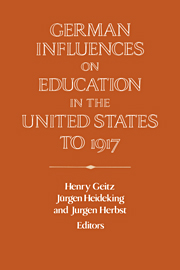Book contents
- Frontmatter
- Introduction
- PART ONE AMERICANS AND GERMANS LOOK AT EACH OTHER'S SCHOOLS
- PART TWO VARIETIES OF TEACHERS AND STYLES OF TEACHING
- PART THREE GERMAN SCHOOLS IN AMERICA
- PART FOUR THE GERMAN INFLUENCE ON HIGHER EDUCATION
- 11 American Students in Germany, 1815-1914: The Structure of German and U.S. Matriculants at Göttingen University
- 12 Philip Schaff: His Role in American Evangelical Education
- 13 German Influence on the Higher Education of American Women, 1865-1914
- 14 Basil L. Gildersleeve: The Formative Influence
- 15 A Mediator between Two Historical Worlds: Hermann Eduard von Hoist and the University of Chicago
- 16 German Influences on American Clinical Medicine, 1870-1914
- Index
14 - Basil L. Gildersleeve: The Formative Influence
Published online by Cambridge University Press: 05 January 2013
- Frontmatter
- Introduction
- PART ONE AMERICANS AND GERMANS LOOK AT EACH OTHER'S SCHOOLS
- PART TWO VARIETIES OF TEACHERS AND STYLES OF TEACHING
- PART THREE GERMAN SCHOOLS IN AMERICA
- PART FOUR THE GERMAN INFLUENCE ON HIGHER EDUCATION
- 11 American Students in Germany, 1815-1914: The Structure of German and U.S. Matriculants at Göttingen University
- 12 Philip Schaff: His Role in American Evangelical Education
- 13 German Influence on the Higher Education of American Women, 1865-1914
- 14 Basil L. Gildersleeve: The Formative Influence
- 15 A Mediator between Two Historical Worlds: Hermann Eduard von Hoist and the University of Chicago
- 16 German Influences on American Clinical Medicine, 1870-1914
- Index
Summary
It is generally held that Basil Lanneau Gildersleeve was the most important and influential classicist in America. What are his claims to such prominence? First, few have been formative figures in American education for longer than he, since he enjoyed a teaching career of sixty-five years. Second, was our most literary classicist at the same time that he was our most scrupulous and masterly grammarian, and he appeals to us today at least as much in the noble humanity of his style as in the humbling regality of his learning. At the time of his death, he could claim pervasive influence in his own land. His edition of Pindar's Olympian and Pythian Odes was recognized as a standard commentary on these poems of the most vexatious classical poet. His Latin Grammar was still in print and widely used. The journal he founded, The American Journal of Philology, continued to hold first rank among international classics journals and to attract the best contributors from this country and Europe. It is the more remarkable that each of these statements remains true today, some sixty-five years after his death.
To discuss Gildersleeve's formative influence on American scholarship and teaching, it is necessary to discuss the influences that formed him, sketching out a portion of his intellectual biography.
- Type
- Chapter
- Information
- German Influences on Education in the United States to 1917 , pp. 245 - 256Publisher: Cambridge University PressPrint publication year: 1995



